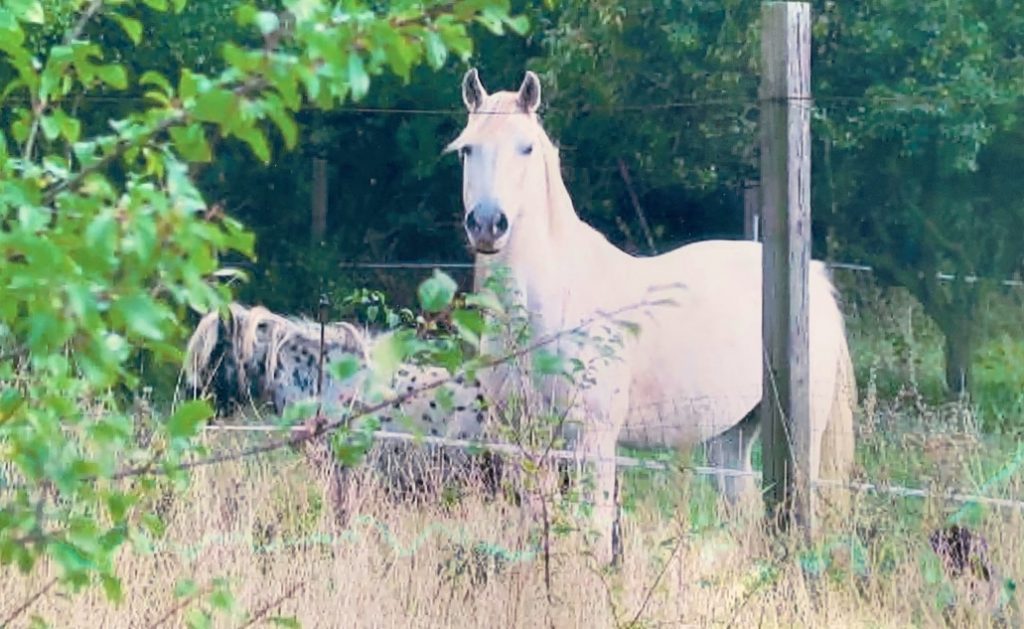Optimism and Pessimism in Non-Human Species

Human-Animal Science
Dogs and Sleep: The Forgotten and Underestimated Need

Human-Animal Science
Why Don’t They Say “Goodbye”?

Human-Animal Science
Hestenes stille lidelse og det (u)menneskelige paradoks

Human-Animal Science
Coping in Animal Behavior

Human-Animal Science
Aggressive and Fearful Behavior in Dogs: Understanding the Misunderstandings

Human-Animal Science
The Silent Suffering of Horses and the (In)human(e) Paradox

Human-Animal Science
Are Animals Intelligent?

Date: July 14, 2017 Author: Roberto Barata Last Update: September 9, 2023. How to cite: Barata, R. (2017). Are Animals Intelligent?. Human-Animal Science. Whether animals possess intelligence has long intrigued pet owners, trainers, and behavioral specialists. However, determining animal intelligence is a complex issue that requires careful consideration of various factors. I will explore the definitions of behavior, intelligence, intelligence in biology, cognition, anthropomorphism, declarative knowledge, and procedural knowledge to establish a solid foundation for evaluating animal intelligence scientifically. Additionally, I will discuss the pitfalls of anthropomorphism and anthropocentrism in labeling animal behavior as intelligent, emphasizing the importance of precision in our definitions and avoiding unwarranted assumptions. Defining Key Concepts Behavior: Behavior refers to an organism’s actions and reactions in response to internal or external stimuli. Intelligence: In a scientific context, intelligence is not a suitable term for describing animal behavior. It is typically reserved for describing the general cognitive abilities observed in humans. Cognition: Cognitive abilities in animals encompass responses to specific events that are studied rather than describing them as “clever” behaviors. Cognitive processes often involve the manipulation of declarative knowledge instead of procedural knowledge. Anthropomorphism: Anthropomorphism is the tendency to attribute human-like qualities or characteristics to animals. Such attributions can distort our understanding of animal behavior. Declarative Knowledge and Procedural Knowledge: Declarative knowledge involves factual or descriptive information, whereas procedural knowledge pertains to skills and processes used to perform tasks. Taking a Scientific Perspective When evaluating animal intelligence from a scientific standpoint, it is essential to consider the concept of biological intelligence in the context of evolution, natural selection, and fitness. Biological intelligence should be defined by an organism’s ability to adapt to its environment and enhance its chances of survival and reproduction. Evolutionary Perspective: One way to understand animal intelligence is to examine it through the lens of evolution. Over millions of years, species have developed diverse cognitive abilities to meet the challenges posed by their environments. For example, some animals have evolved remarkable problem-solving skills that are highly adaptive, while others have developed intricate social structures and communication systems. Examples of Cognitive Abilities: Researchers have uncovered various examples of animal cognitive abilities. For instance, studies of corvids like crows and ravens have demonstrated their ability to use tools, plan for the future, and understand cause-and-effect relationships. Dolphins exhibit complex communication and problem-solving abilities, and primates like chimpanzees and bonobos have shown advanced social intelligence and the capacity to learn from one another. Ethical Considerations: While exploring animal intelligence, ethical considerations are paramount. Understanding animal cognition affects how we treat and interact with animals, particularly in research and captivity. It raises questions about our moral responsibility towards intelligent species and prompts animal rights and welfare discussions. Comparative Intelligence: To assess animal intelligence, scientists often employ comparative psychology, which involves studying the cognitive abilities of different species and comparing them. This approach helps us gain insights into the diversity of intelligence across the animal kingdom. For example, while some animals excel in spatial reasoning, others showcase impressive memory or communication skills. Understanding these variations sheds light on the adaptive value of different forms of intelligence in various ecological niches. Technological Advancements: Recent technological advancements have revolutionized the study of animal intelligence. Researchers can now use tools such as GPS tracking, neuroimaging, and advanced behavioral monitoring to delve deeper into the intricacies of animal cognition. These innovations enable scientists to gather data with unprecedented precision, expanding our knowledge of the cognitive processes that underpin animal behavior. In Summary Various scientific studies have explored animal cognition in navigation, problem-solving, social interactions, deceit, language, and abstract thinking. These investigations have necessitated the postulation of cognitive processes to explain observed behaviors. However, it is essential to note that such suggestions remain a subject of debate within the scientific community. Whether animals can think is an ongoing inquiry, underscoring the need for precision in our definitions and a cautious approach to labeling or defining behaviors. Multimedia Articles https://www.researchgate.net/publication/283864004_Intelligence_in_Nonprimates https://www.researchgate.net/publication/288728672_Animal_intelligence_Laboratory_experiments_and_observations_in_nature References & Suggested Reading Chance, P. (2008). Learning and Behavior. Wadsworth-Thomson Learning, Belmont, CA, 6th ed. Darwin, C. (1859). On the origin of species 1st Edition. John Murray, Albemarle Street. DeMello, M. (2012). Animals and Society: An introduction to human-animal studies. Columbia University Press. Hickman, P. (2008). Integrated Principles of Zoology, 14th Edition. McGraw-Hill. Lorenz, K. (1981). The foundations of ethology. Based on a translation of Vergleichende Verhaltensforschung, with revisions. Springer Science+Business Media New York. Martin, P., Bateson, P. (2007). Measuring Behavior, An Introductory Guide. Cambridge University Press. McFarland, D. (1998). Animal Behaviour. Benjamin Cummings. 3rd ed. McFarland, D. (2006). Dictionary of Animal Behavior. Oxford University Press. Shettleworth, S. (2010). Cognition, Evolution, and Behavior—Second Edition. Oxford University Press. Smith, J.M. (1988). The Evolution of Animal Intelligence. In: Did Darwin Get It Right?. Springer, Boston, MA. https://doi.org/10.1007/978-1-4684-7862-4_21
Dominance in Dogs: A Comprehensive Scientific Compilation

Date: May 16, 2012 Author: Roberto Barata Last update: Mar 2024. How to cite: Barata, R. (2012). Dominance in Dogs: A Comprehensive Scientific Compilation. Human-Animal Science. The exploration of knowledge, both tangible and digital, offers an expansive landscape for discovery. Yet, navigating this terrain, searching for dependable, fact-based insights on particular topics can often prove challenging. It’s imperative to approach scientific inquiry with an unbiased lens, ensuring that our ethical convictions do not cloud the objectivity of our findings. By rigorously defining terminology and concepts, we commit to the ethos of professionalism, skillfully separating empirical evidence from widespread myths and cultural narratives. This commitment fosters a deep respect for all life forms, each possessing its unique mode of communication. In this context, I have curated a collection of scholarly articles and research findings from authoritative sources, addressing various aspects of animal behavior. This compilation, subject to periodic updates, is designed to serve as a solid informational base. The material herein is intended to empower you with a well-informed perspective, enabling you to partake in profound and informed dialogues. I invite you to invest time perusing these carefully selected references, laying a robust scientific groundwork. This foundation will enrich your understanding and equip you with the intellectual tools necessary for engaging in substantial discussions on the subject. Articles Dominance, submission, hierarchies, ethograms, and all scientific definitions on the subject. Article by Dr. Roger Abrantes. Dominance and aggressiveness – Critical reasoning. Article by Dr. Roger Abrantes. Canine Ethogram—Social and Agonistic Behavior, by Dr. Roger Abrantes. Dr. Simon Gadbois’s article on dominance and punishment. Canine Ethogram-Social and Agonistic Behavior. Article by Dr. Roger Abrantes. Article by Dr. Marc Bekoff with the testimony of Dr. David Mech stating that he never rejected the notion of dominance. Dominance and Pseudo-science. Article by Dr. Marc Bekoff. Dogs display dominance—article by Dr. Marc Bekoff with several studies and other essays on the subject. Study the ontogeny of social play and agonistic behavior in selected canid species. Study with quantitative analysis of dominance in domestic dogs. An article by Dr. David Mech in 2011 stated that there is no problem using the term “alpha” with wolves in some cases and that the problem was the complete misrepresentation of the term (page 8). Another study about dominance in domestic dogs. Study about Age-graded dominance hierarchies and social tolerance in packs of free-ranging dogs. Various articles and studies about Social Hierarchies. Use wrong wolf generation time in assessments of domestic dog and human evolution. Dr. Mech: Alpha Status, Dominance, and Division of Labor in Wolf Packs. Dr. David Mech: Leadership in wolf, Canis lupus, Packs. Ethology Institute live about the “Alpha Dog” meme. A Dog Is Not a Wolf—Is It? – Roger Abrantes. In a 2023 interview with Dr. David Mech, he clearly says that he never denied the term “dominance” and never spoke about dogs, confirming that “dog people” completely misunderstood his words. Recommended Reading Abrantes, R. (1997). The Evolution of Canine Social Behavior. Wakan Tanka Publishers. Abrantes, R. (1997). Dog Language. Wakan Tanka Publishers Barata, R. (2024). Anthrozoology & Animal Training, A Paradigm Shift, 2nd Edition. Human-Animal Science. Coppinger, R. and Coppinger, L. (2001). Dogs: a Startling New Understanding of Canine Origin, Behavior and Evolution. Scribner. Eaton, Barry. (2002). Dominance in Dogs: Fact or Fiction? Dogwise. McFarland, D. (1998). Animal Behaviour. Benjamin Cummings. 3rd ed. McFarland, D. (2006). A Dictionary of Animal Behaviour. Oxford University Press Székely, T. (2010). Social Behaviour, Genes, Ecology, and Evolution. Cambridge University Press. Watson, J.C., Arp, Robert. (2015). Critical Thinking—an introduction to reasoning well. Bloomsbury Academic.

